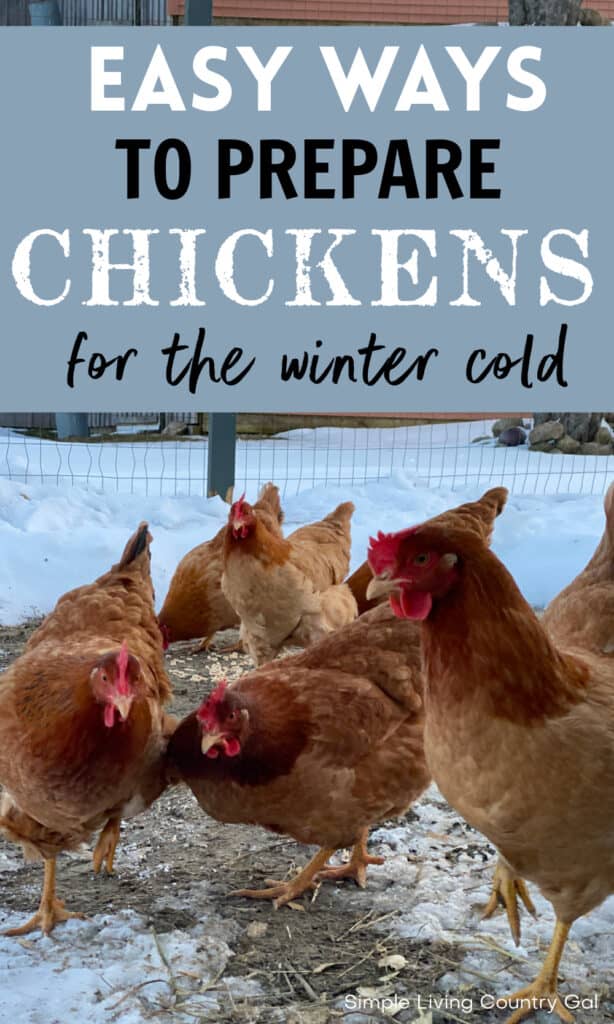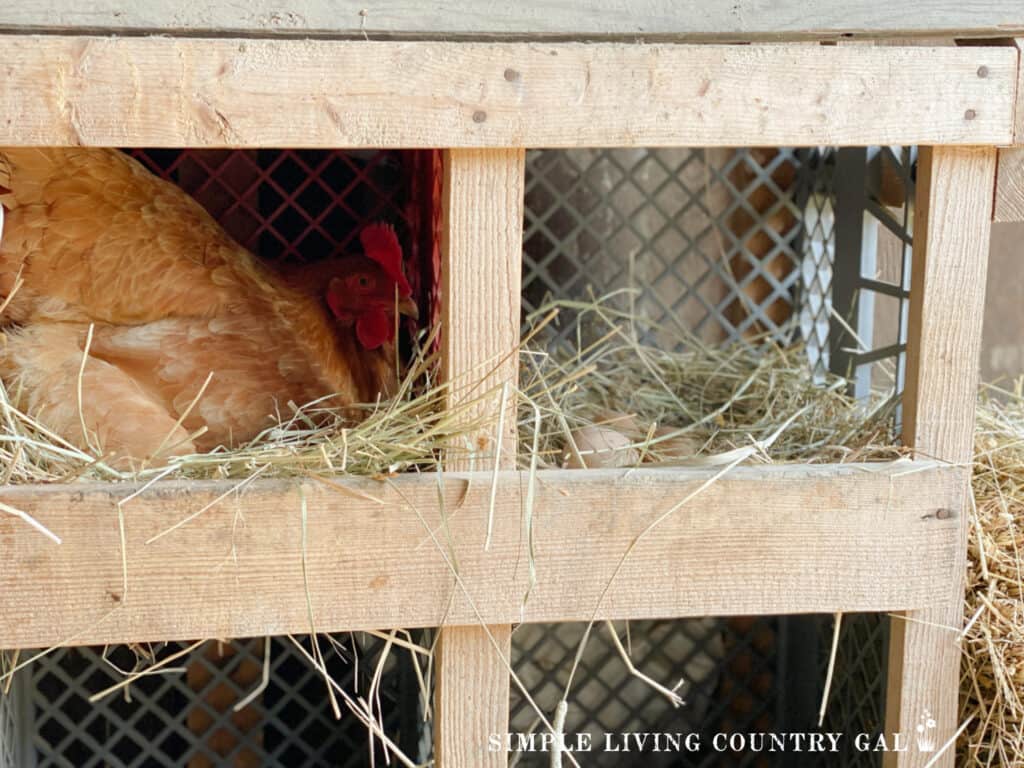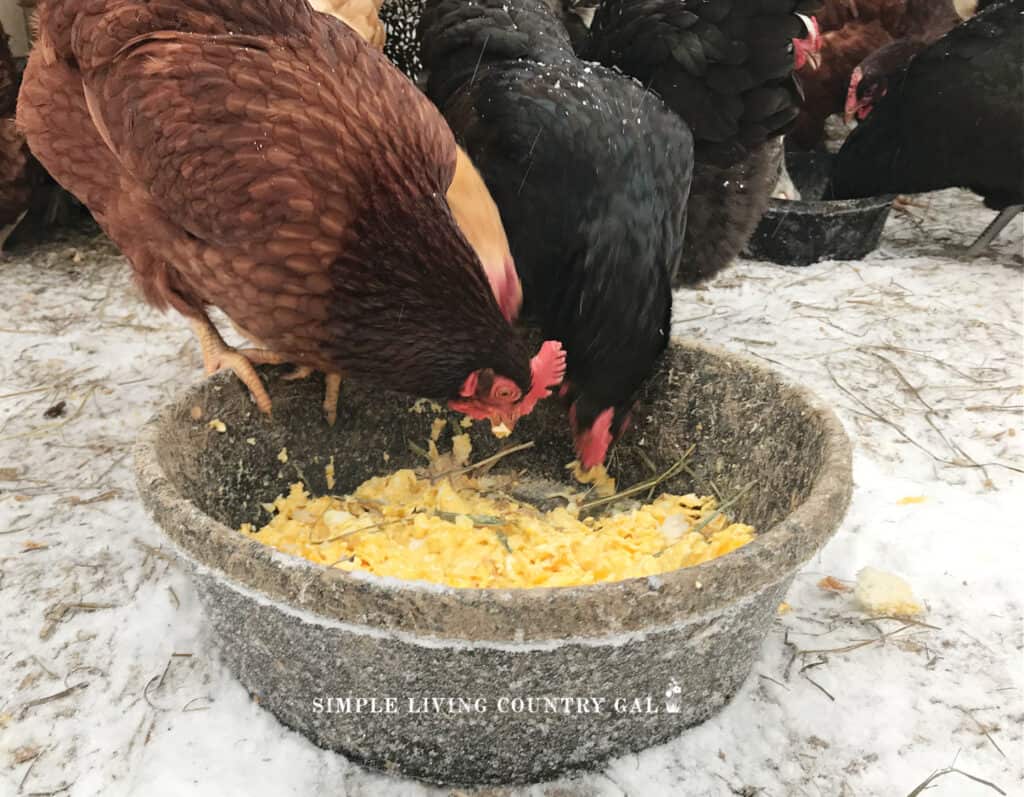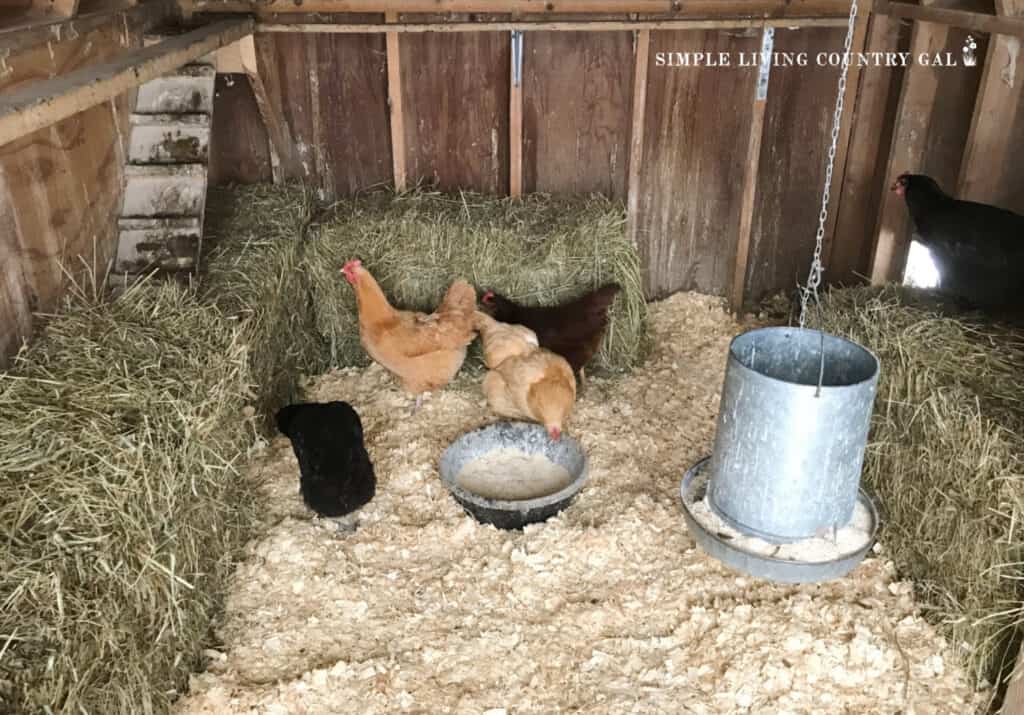how to prepare chickens for winter
Let’s face it, winter is cold. Especially here in Pennsylvania. Because of that, we have things we do to prep our shelters and animals prior to the first snowfall. This article will show you how to prepare your chickens for winter so they can better handle cold temperatures.
Raising chickens that are healthy, productive egg layers all year long is a great way to be a responsible homesteader.

You may be in the middle of winter right now, or it may be soon on its way. No matter what the weather is, as you read this, these tips will help your flock prepare for the cold, wind, and snow.
If you’re a homesteader, you know that chickens can be hardy creatures but may need extra help to get through colder seasons. In this article, we’ll look at several ways to prepare your chickens for winter weather and keep them healthy during the cold months. We’ll explore things like proper diet, adding ACV to water, minerals, supplements, and even tips on how to prepare your coop.
Can chickens lay eggs in the winter?
Yes, chickens can lay eggs in the winter. However, their production may decrease due to colder temperatures and shorter daylight hours. Ensuring that they have a warm coop that includes insulated nesting boxes will not only keep your hens warm but it will keep their eggs from freezing.
You can insulate nesting boxes by adding thick layers of straw and bedding. You can also put curtains over the opening to give extra insulation if needed.

Do chickens get frostbite?
Yes, chickens can get frostbite on their combs and wattles due to the cold temperatures. Use these tips to create a warmer coop so they can get protection from harsh elements.
You can also give extra protection from frostbite by applying Vaseline, Bag Balm, or other thick salves on those exposed areas.
How to prepare chickens for winter
All of these tips are ones we use with our own chickens, and we find they work great alone but even better when you incorporate them all.
Proper Diet
One way to help chickens cope with winter is to provide them with a balanced diet. In winter months, it’s essential to provide high-nutrient foods that keep chickens warm and well-fed. Since chickens burn more calories to stay warm during the winter, they need foods that are high in protein and fat.
Include foods like cracked corn, sunflower seeds, and mealworms in their diet. Also, make sure that they have access to clean and fresh water. Water helps regulate the body temperature, so keep their water thawed with a heated waterer or by changing it several times a day.
READ: Caring for Chickens in the Winter
Can you give eggs to chickens?
Yes, you can give eggs to chickens, even the shells. Not only do they love the taste but the benefits we receive when we eat eggs our chickens will benefit from as well.
Eggs are a great source of protein and can give an energy boost to sick hens or chickens during the winter. Scrambled eggs are a favorite of our own hens especially on cold winter mornings.

Adding ACV to water
Adding Apple Cider Vinegar (ACV) to drinking water is beneficial to your chickens, especially during winter. ACV helps maintain a healthy digestive system, protecting chickens from getting sick. It boosts overall health, and its acidity helps chickens break down food more efficiently, giving them more energy to keep warm. Add one tablespoon of ACV to each gallon of drinking water.
Read more on the benefits of ACV and your chickens here.
Minerals and supplements
Minerals and supplements are essential for chickens’ overall health and well-being, especially during winter. Calcium supplements can help prevent egg-laying problems, which can be common during the colder months. Chickens need sufficient vitamins and minerals to maintain a healthy immune system, which is where supplements come in.
Vitamin E is vital for a healthy nervous system, Vitamin D helps with calcium absorption and immune function, and Vitamin A supports organs like the liver and eyes. Rather than give these vitamins separately, we suggest purchasing vitamins such as Vital Nutrients. These are made specifically for chickens and can be added to their feed.
Preparing your coop
Your chicken coop needs to be well-prepared for winter to ensure that chickens have adequate protection from harsh elements. Let’s go over what you can do to winterize their coop.
#1. Drafts – Make sure that the coop’s windows and doors are well sealed and there are no drafts.
#2. Air Flow – Yes, you want to be sure there are no drafts in a coop, but you still need good airflow. This will keep the air fresh helping to protect your hens from developing respiratory issues. A vent in the ceiling of the coop is usually sufficient for good airflow.
#3. The Floor – Insulate the ground with a thick layer of bedding such as straw, hay, or pine shavings. These materials create a barrier between the ground and their bodies, keeping them warm.
#4. Nesting Boxes – Add extra bedding to your nesting boxes to keep your chickens warm and also keep eggs from freezing.
#5. The Walls – Add extra insulation inside of the coop by placing hay or straw bales around the inside perimeter. This is something we do every year and find it really helps to keep the inside of the coop warmer.

Provide warmth
Another way to keep your flock warm during winter is to provide a heat source. Chickens can tolerate temperatures as low as 20°F, but their combs and wattles are prone to frostbite. You can provide heat to the coop in various ways like a heat lamp or radiant heat panels.
Ensure that these heating sources are kept away from bedding or any flammable materials and are kept out of your chicken’s reach to avoid accidents.
Preparing your chickens for winter will help them stay healthy and happy. A proper diet, supplements, and a well-prepared coop with appropriate heating sources will ensure that your chickens can withstand temperature drops.
Remember that chickens are hardy creatures that can survive almost any weather. Allow them to adapt to the seasons naturally and your entire flock will do just fine. Give a little extra care and attention, and they’ll make it through winter with flying colors.
